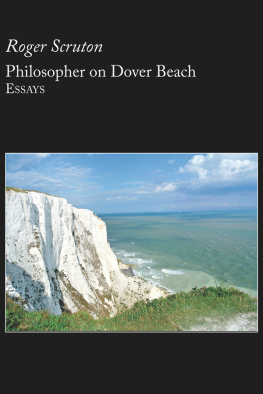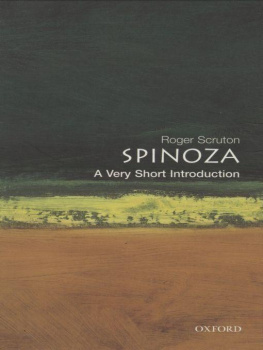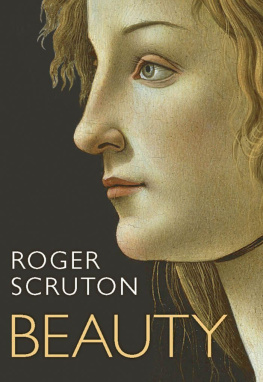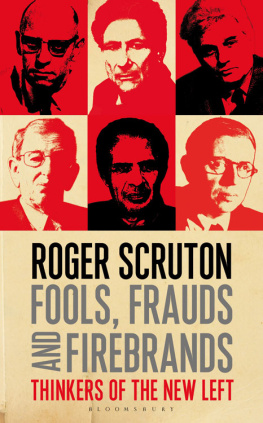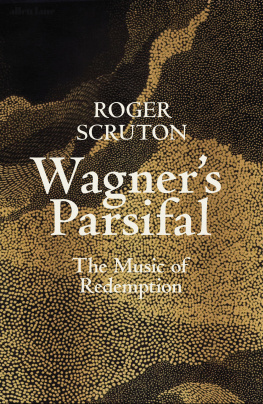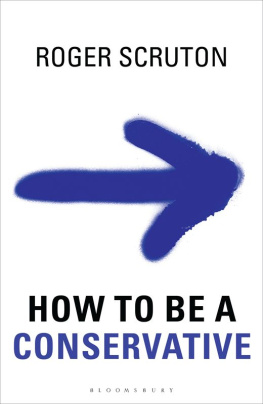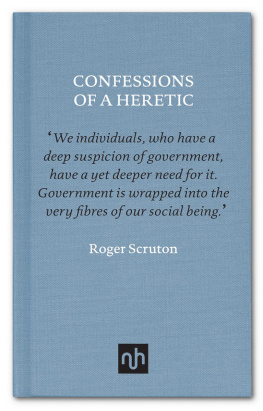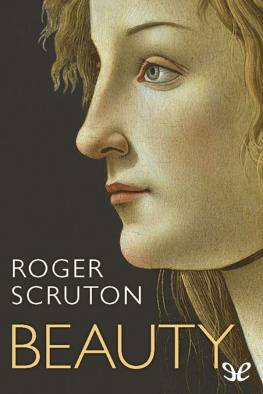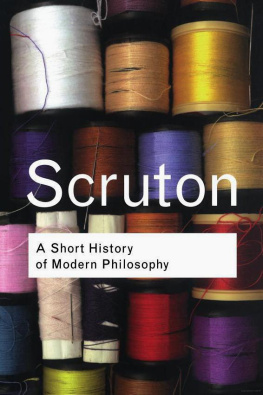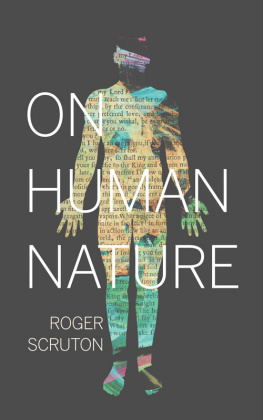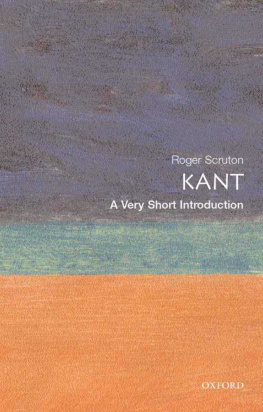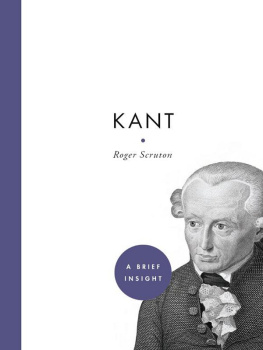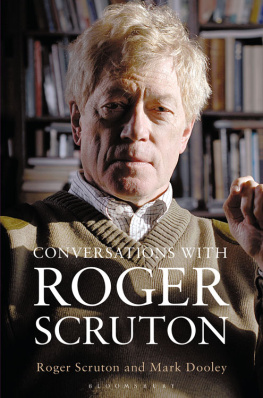Roger Scruton - Philosopher on Dover Beach essays
Here you can read online Roger Scruton - Philosopher on Dover Beach essays full text of the book (entire story) in english for free. Download pdf and epub, get meaning, cover and reviews about this ebook. year: 1999, publisher: St. Augustines Press, genre: Religion. Description of the work, (preface) as well as reviews are available. Best literature library LitArk.com created for fans of good reading and offers a wide selection of genres:
Romance novel
Science fiction
Adventure
Detective
Science
History
Home and family
Prose
Art
Politics
Computer
Non-fiction
Religion
Business
Children
Humor
Choose a favorite category and find really read worthwhile books. Enjoy immersion in the world of imagination, feel the emotions of the characters or learn something new for yourself, make an fascinating discovery.
- Book:Philosopher on Dover Beach essays
- Author:
- Publisher:St. Augustines Press
- Genre:
- Year:1999
- Rating:4 / 5
- Favourites:Add to favourites
- Your mark:
- 80
- 1
- 2
- 3
- 4
- 5
Philosopher on Dover Beach essays: summary, description and annotation
We offer to read an annotation, description, summary or preface (depends on what the author of the book "Philosopher on Dover Beach essays" wrote himself). If you haven't found the necessary information about the book — write in the comments, we will try to find it.
Philosopher on Dover Beach essays — read online for free the complete book (whole text) full work
Below is the text of the book, divided by pages. System saving the place of the last page read, allows you to conveniently read the book "Philosopher on Dover Beach essays" online for free, without having to search again every time where you left off. Put a bookmark, and you can go to the page where you finished reading at any time.
Font size:
Interval:
Bookmark:

Copyright 1990, 1998 by Roger Scruton
All rights reserved. No part of this book may be reproduced, stored in a retrieval system, or transmitted, in any form or by any means, electronic, mechanical, photocopying, recording, or otherwise, without the prior permission of St. Augustines Press.
Manufactured in the United States of America.
Cataloging in Publication Data
Scruton, Roger.
Philosopher on Dover Beach : essays / Roger Scruton.
p. cm.
Includes bibliographical references (p. ) and index.
ISBN 1-890318-60-4 (alk. paper)
1. Philosophy and culture. 2. EuropeCivilizationPhilosophy. I. Title.
B59.S37 1998
824.914dc21
97-37676
CIP
The paper used in this publication meets the minimum requirements of the American National Standard for Information SciencesPermanence of Paper for Printed Materials, ANSI Z39.48-1984.
ISBN-13: 978-1-58731-668-5 (electronic)
The culture of Europe, and the civilization that has sprung from it, are not yet dead. The opportunity remains to give our best to them, and to receive, in reward, the experience of belonging. For a century or more, Western man has listened to prophecies of his own decline, has been schooled in guilt and self-abnegation, and has doubted the civilizing force of his beliefs, his institutions and his way of life. Since nothing has ever been put in the place of those good things, save tinsel illusions and lawless power, the result of this self-repudiation has been a kind of active nihilism a nihilism not of the mind and the soul only, but of the forms of social life and the structures of political power.
It is unfashionable to say that Western civilization still lives, that it is nobler, better and more worthy of survival than its rivals, and that we ought to cease our childish lamentations and give ourselves to its defence. Nevertheless, I hope that these essays offer some partial vindication of the culture of Europe, and of the moral sense that speaks through it. And I hope that some of my readers will take heart, recognizing that there is a way out of the barrenness of modernism, and that it is a way not forwards into the unknown, but backwards into the familiar. These essays and reviews, written over a decade, form a sequel to an earlier collection, The Politics of Culture. Three categories have been excluded from this collection: those of ephemeral interest; those on architecture, which will appear in another volume; and those addressed to the readers of learned journals. The learned journal is an important institution, and some of my arguments here are taken further in pieces submitted to academic editors. Nevertheless, the language of scholarship has been corrupted. The constraints of the modern university lead to a style of thought that is both intellectually timorous and asleep to the sensory world. I have therefore tried to distance myself from academic philosophy. Here and there as in the essay on Masaryk and Patoka I suggest other tasks for philosophy than those favoured by the schools. I also try to revive the concern for culture, as the neglected purpose of intellectual life. Andeverywhere I endeavour to combine subjects which, while belonging to separate academic compartments, belong together in the spiritual life of modern man.
Some of these essays appear for the first time; others are reprinted, or adapted from material already published. I am grateful to the various editors for permission to use them again.
London, September 1989
In The Critique of Pure Reason, Kant struck such a blow against the traditional arguments of theology as to leave that science in a condition of self-doubt from which it has never recovered. Nevertheless religion survived; it was Kants declared hope, indeed, that, by destroying the claims of Reason, he had made room for those of Faith. It may not be possible to deduce the existence of a necessary being from the premiss of the worlds contingency; yet a true understanding of the world and of our place as free beings within it opens the way, he thought, to a religious experience that is all the more secure through being independent of theology. Through the moral law, and the act of obedience which it compels from us, we are presented with so vivid an intimation of transcendence, as to want nothing that is needed for the worship of God.
In The Critique of Practical Reason, Kant went further, arguing that practical reason, which is the foundation of morality, could provide a substitute for theology, a new science of the divine which would uphold the very system of beliefs that traditional theology had sought in vain to justify. We need not follow Kant into these difficult regions in order to feel some sympathy for the idea which originally inspired him: the idea that morality, far from depending on the belief in God, provides a unique and vivid support for it. So persuaded was Kant, however, by the view that morality is the ground rather than the consequent of religion, that he allowed himself to describe the moral life in terms borrowed directly from liturgical tradition. The worship due to God became a kind of reverence for the moral law. The faith which transcends belief became the certainty of practical reason, which surpasses understanding. The object of esteem was not the Supreme Being, but the supreme attribute of Reason.The moral order was the realm of grace, the actual community of rational beings the mystical body in the world of nature, and the Kingdom of God to which mortals aspire became the Kingdom of Ends which they make real through their self-legislation.
Thus, in providing a moral basis for religious doctrine, Kant presented a thoroughly theologized morality, one which preserved, in transfigured form, the basic conceptions of Christian doctrine. It is not surprising, therefore, if Nietzsche, in his persona as Antichrist, should have sought to undo the work of this catastrophic spider. The web of sophistication which Kant had spun around the Christian religion was torn to shreds. Nietzsche was one of the officious housemaids who savaged it; the other was Marx. Both wished to destroy the authority of Christian doctrine by providing a naturalistic explanation a genealogy of our belief in it. For Nietzsche, Christianity, and the Kantian morality which now sits bareheaded upon the grave thereof, are illusions of the resentful, distorting mirrors in which the strong are crumpled and the cripples stand tall. For Marx, religion was the controlling ideology of the powerful, which translates the artifice of power into a natural order and a gift of God. For both of them, the inherited religion of the West is not just an untruth, but a sophisticated lie.
The Nietzschean and Marxian explanations of Christian belief are incompatible. It is therefore somewhat surprising that the two philosophies are not more fervently at loggerheads, that Marxists do not devote pages to the refutation of the Nietzschean theory of ressentiment, and Nietzscheans pages to the refutation of the Marxist theories of ideology and class. A Marxist, wishing to increase the power of the powerless, seeks to destroy religion; if a Nietzschean joins with him in the work of destruction, however, it is because he seeks to take away from the powerless the little power that they have. Nevertheless, both Marxists and Nietzscheans rest secure in the belief that either of their explanations will undermine the credibility of the thing explained. This undermining of belief is the real source of the appeal of both philosophies the sense that the world is being rid of faith, mystery and illusion; that we are coming face to face with a bare reality, and also with ourselves as part of that reality, the disillusioned centre of an ungoverned world.
Font size:
Interval:
Bookmark:
Similar books «Philosopher on Dover Beach essays»
Look at similar books to Philosopher on Dover Beach essays. We have selected literature similar in name and meaning in the hope of providing readers with more options to find new, interesting, not yet read works.
Discussion, reviews of the book Philosopher on Dover Beach essays and just readers' own opinions. Leave your comments, write what you think about the work, its meaning or the main characters. Specify what exactly you liked and what you didn't like, and why you think so.

